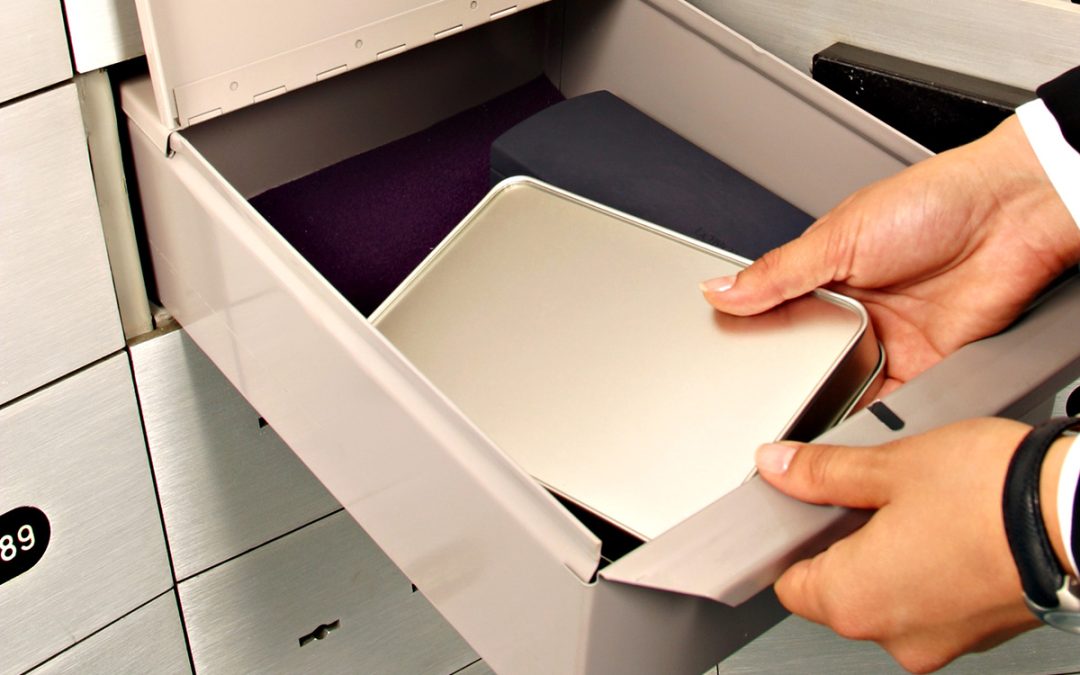Things to Know About a Safe Deposit Box, Home Safes & Your Valuables
Over time, your valuables change, and so do the tools available to protect them. How should you be keeping your most important things more secure?
Think about what should (or shouldn’t) be kept in a bank’s safe deposit box.
Good candidates for a safe deposit box include originals of these documents:
- Birth certificates
- Property deeds
- Car titles
- Savings Bonds
- Social Security card
Other possibilities for the box include family keepsakes, valuable collections, pictures or videos of your home’s contents for insurance purposes, and irreplaceable photos.
Be mindful not to use your safe deposit box to store anything you might need to access quickly or when the bank is not open.
That could include passports and originals of your “powers of attorney” documents that authorise others to transact business or make decisions about medical care on your behalf. For guidance on where to store your original will, check with an attorney about what is required or recommended based on state law.
Stash cash in a bank deposit account, like a savings account or certificate of deposit, rather than in a home safe or a safe deposit box.
Among the reasons: “Cash that’s not in a deposit account isn’t protected by FDIC insurance,” noted Luke W. Reynolds, Chief of the FDIC’s Community Outreach Section. By law, the FDIC only insures deposits that are in deposit accounts at insured institutions and only in the rare instances when a bank fails.
Remember, a safe deposit box is not a deposit account. It is storage space provided by the bank, so the contents, including cash, checks or other valuables, are not insured by FDIC deposit insurance if damaged or stolen. Also, financial institutions generally do not insure the contents of safe deposit boxes. If you want protection for the valuables in your safe deposit box or home safe, talk to your homeowner’s or renter’s insurance agent about adding coverage under these policies.
“And unlike money in a savings account, money in a home safe or safe deposit box cannot earn interest, so the purchasing power of your cash will decrease,” said Reynolds.
Also read the terms of the safe deposit box rental agreement, as the bank may limit what you can keep in the box. These limitations could include cash.
A home safe is not a true replacement for a safe deposit box from the bank
A home safe could be used to store replaceable items that you may need immediate access to – such as a passport. But home safes are not as secure as safe deposit boxes. “A burglar could more easily break into your home and open the safe than get inside your safe deposit box at your bank,”said Reynolds.
No safe deposit box or home safe is completely protected from theft, fire, flood or other loss or damage.
Consider taking precautions, such as protecting against water damage by placing items in water-safe, zippered plastic bags or other plastic containers that can be resealed. And, don’t keep identifying information on or near your safe deposit box key, such as the box number and the bank’s name, in case of loss or theft.
You may want to consider making copies of important documents – and keeping those copies in a separate location. For example, keep your original passport in your home safe and save a digital copy in a password-protected server or secure website.
Be mindful of who you allow to access your safe deposit box
You can jointly rent a safe deposit box with one or more people who you would like to give unrestricted access. Please note, your bank will not be responsible for anything removed by those authorised to access the box.
For more information on storing goods in a safe deposit box contact Soteria Safes.
The original version of this article was published in www.wafdbank.com


Recent Comments